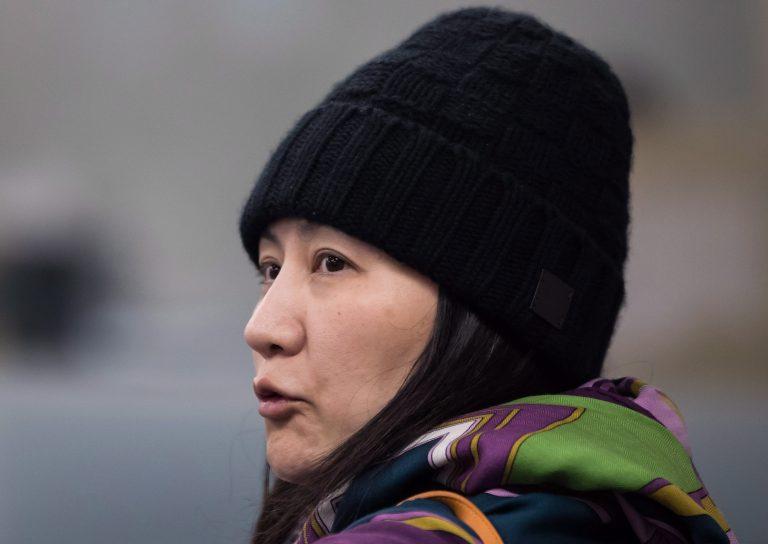With friends like the U.S., who needs enemies like China?
Politics Insider for Dec. 13: China’s retaliation against Canada continues, Trudeau and Freeland blast Trump for politicizing the Meng case and MPs, reporters and others bid farewell to Centre Block

Huawei chief financial officer Meng Wanzhou, talks with a member of her private security detail after they went into the wrong building while arriving at a parole office, in Vancouver, on Wednesday December 12, 2018. THE CANADIAN PRESS/Darryl Dyck
Share
Welcome to a sneak peek of the Maclean’s Politics Insider newsletter. Sign-up at the bottom of the page to get it delivered straight to your inbox.
At least two Canadians have now gone missing in China amid that country’s repeated threats to punish Canada for the arrest of Huawei CFO Meng Wenzhou. Michael Spavor hasn’t been heard from since he contacted Canadian officials to say he’d been questioned by Chinese authorities. Spavor, who lives in China, is best known for helping to arrange Dennis Rodman’s visit to North Korea. Meanwhile, according to Chinese press reports Michael Kovrig, a former Canadian diplomat, was seized by state police and accused of “participating in activities that harm China’s national security.” His exact whereabouts are unknown. (Globe and Mail)
U.S. President Donald Trump—who also considers Canada to be a national security threat—massively complicated the Meng case and undermined Canada’s position with China by offering to upend the U.S. rule of law and free her if China would do a trade deal with him. Prime Minister Justin Trudeau called Trump’s remark “troubling” and said “Canada is acting in good faith, responding to a U.S. extradition request in accordance with the law. … Regardless of what goes on in other countries, Canada is — and will always remain — a country of the rule of law.” (Canadian Press)
Foreign Affairs Minister Chrystia Freeland also took aim at Trump. Countries seeking extraditions from Canada must, she said, “ensure that any extradition request is about seeing that justice is done” and not about “political interference. … Our extradition partners should not seek to politicize the extradition process or use it for ends other than be pursuit of justice.” (Global News)
Political life at Centre Block is winding down ahead of the big renovation. Trudeau offered his thoughts during what was likely his last time entering Question Period in the building (at least for a decade) before engaging in a final Centre Block sparing match with Conservative Leader Andrew Scheer. Hill reporters, MPs and others have been saying farewell on Twitter and sharing moments of nostalgia, like what it’s like to walk down the stairs to the Commons and a stroll down the portrait hallway of former prime ministers. Trudeau delivered a final farewell speech, as did Scheer. Meanwhile MPs gathered for a last group photo.
Conrad Black might regularly write fawningly of Trump, but Lord Black of Crossharbour has not formally applied for a pardon from the president. “You are correct that no pardon has been applied for, and I have no comment on the subject,” Black wrote in an email late last month. “The public speculation about it that I have seen is bunk.” That doesn’t mean the speculation won’t continue, or that Trump won’t eventually pardon his old friend, writes Stephen Maher:
David Adler, president of the Idaho-based Alturas Institute, says that Trump’s pardons have so far been transactional, like everything else he does. So if he pardons Black, it will be because he thinks it will help him.
“If Trump were to pardon Black it would be a reflection of Black’s craven flattery of the president as seen in his book and articles striking Trump’s ego, and an expectation that Black would somehow support Trump’s Reelection bid,” Adler said. (Maclean’s)
It’s been nearly 20 years since Nunavut was added to the map of Canada. Yet Nunavut’s progress has been marred by missed deadlines and slow starts caused by unproductive discussions, backsliding and funding disputes:
Over the past two decades, the initial euphoria among Inuit for Nunavut has faded. Many aspects of the ambitious project remain unfulfilled, leading many Inuit, who make up 85 per cent of the population, to doubt they can still realize their aspirations through the territorial public government.
Nunavut Tunngavik Inc. (NTI), an organization responsible for ensuring the other levels of government fulfill promises made under the 1993 settlement, is now considering an alternative path. In October, its board passed a resolution to explore potential models for Inuit self-government. “We’re being reflective: what are ways in which we can ensure Inuit needs and points of view are being looked at and engaged in, not in a superficial way?” says Aluki Kotierk, the president of NTI. “Is there a better way in which we can serve Inuit? If the territorial public government isn’t meeting the needs of Inuit, is there another way in which we can do that?” (Maclean’s)